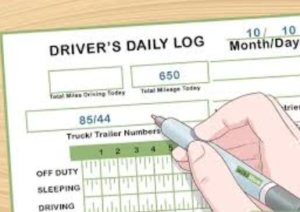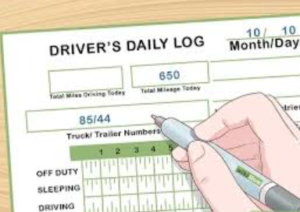How a Truck Driver’s Record of Duty or Driver Logbook Can Assist After a Kansas City Truck Accident
The truck logbook is the record of a truck driver’s time record of when he was on duty. It is used to keep track of the hours of driving, resting periods, and records of duty status throughout the course of the job. After a truck accident in Kansas City, MO, a truck driver’s record of duty and logbook can be very useful as evidence in a personal injury case. We have put together some helpful info on our website about the importance of the logbook, the contents of a diver time record, and other relevant information!
How can a logbook help after a Kansas City truck accident?
 The Federal Motor Carrier Safety Administration (FMCSA) has set out rules and regulations for truck drivers to increase the safety of highways across the U.S. For this purpose, all truck drivers are required to keep a truck driver logbook which consists of a record of duty status;
The Federal Motor Carrier Safety Administration (FMCSA) has set out rules and regulations for truck drivers to increase the safety of highways across the U.S. For this purpose, all truck drivers are required to keep a truck driver logbook which consists of a record of duty status;
– Number of driving hours
– Sleeping logs
– Other activities during the course of duty
Similar to other States, Missouri or Kansas driving record in a driver time record is essential to maintain in the logbook. The contents of the logbook can help in determining if the truck driver had violated any provisions of logbook rules. One of the most important rules is the maximum hours a driver can drive a truck. Drowsy driving can cause heavy accidents and crashes on highways due to the fatigue and sleepiness of truck drivers. Every State has a Department of Transportation (DOT) that overlooks supervision of the rules and regulations of the Federal Motor Carrier Safety Administration (FMCSA). Failure of truck companies or individual drivers to conform with these regulations can cause personal injury liability on them in the event of an accident or crash. In Kansas, the Kansas Department of Transportation (KDOT) is responsible for monitoring compliance with FMCSA regulations by the trucking companies. The department can also help with driving records in Kansas if you have suffered a personal injury in an accident. The Kansas driver records in the logbook can aid you in establishing the liability of the trucking company or individual truck driver by simply checking if the driver was violating logbook rules. A logbook is a piece of crucial evidence in determining the liability in personal injury claims.
Hiring a personal injury lawyer is essential because the attorney can preserve and analyze the logbook evidence to facilitate your personal injury claim. Although a personal injury claim can be made without legal representation, hiring a personal injury attorney enhances your chance to win suitable compensation. Most people only claim compensation for physical hurt and are unaware they can claim compensation for the psychological, mental, and emotional agony they have experienced due to the accident. Only an experienced personal injury lawyer can help you estimate the compensation you deserve.
What kind of records will you find in a truck driver’s logbook?
According to the regulations of federal law, the driver has a legal duty to record;
- Off-duty hours
- On-duty hours
- Sleeping time or the time they took a break
- Any accidental or unusual event for which they had to pause their work
- Any other activity
A standard logbook contains the same information, and it is not hard to find the relevant info in the hour of need. A general guideline on how to fill out logbooks for truckers or record truck driving hours is provided by all trucking companies to their employees.
On-duty hours: Logging the on-duty hours are most important. According to federal law, a truck driver cannot drive a truck for more than 10 hours in a single drive. There are records of duty status forms that help log the on-duty hours. Failure to comply with this rule may result in a serious breach of federal law in the event of a collision, crash, or accident, and the liability for compensation shifts to the trucking company.
Off-duty hours: Off-duty hours may include leisure time and other activities that may or may not include sleeping. According to Sleep Foundation guidelines, an adult human requires eight to ten hours of sleep per day. It is the internal reboot system of the body which ensures maximum performance of the human body. Truck drivers are required to record truck hours that are spent on leisure or sleeping in the logbook.
Sleeping hours: By federal regulation, every truck must have a sleeper for the driver in which they can rest. The driver is required to log sleeping hours in the logbook to avoid liability in personal injury claims if an accident occurs.
What if the Logbook is incorrect, incomplete, or forged?
It is the expertise of an experienced personal injury lawyer to say if the record of duty status in a logbook has been changed, incorrect, incomplete, or simply misleading. With the advancement of technology, a forged record in a logbook is not hard to find. Driving records Kansas can also be found easily. Some trucking companies tamper with the logbooks of their drivers, or the divers do it without the knowledge of their employer so they can work more hours. Violation of federal law can penalize drivers who work more than the threshold hours. This is also important in personal injury lawsuits and helps to establish negligence and failure to perform the duty of care on the road by the truck driver resulting in the injury of a person in an accident.
Final Word
Truck drivers and trucking companies are legally required by federal law to maintain a logbook in which they have to log the hours of their work — on-duty, off-duty, and sleeping hours. Maintaining a logbook is necessary because if an accident happens due to the negligence of the truck driver, the injured person can bring the claim against him in a personal injury lawsuit, and the violation can be proved by examination of the logbook to establish liability. Sometimes, the entries in the logbook are incorrect, so you need an experienced lawyer to catch them.
- Key Facts About Missouri’s No Pay No Play Law - 28th May 2025
- Understanding Taxes on Personal Injury Settlements - 23rd May 2025
- Navigating Your Rights After a Car Crash While Pregnant - 21st May 2025


